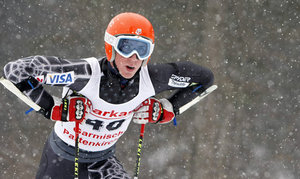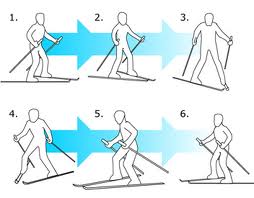This is the first of a series of Ski Racing tips and theory from various acclaimed authorities throughout the racing faternity, applying this along with the advice from your Ravens coach should allow you to perform at a higher level.
This Months subject : Inside the Ski Racing Mind: 5 Tips for Race-day Success
 So what do you need to do to be totally prepared to ski your best on race day? If you ask the top-ten men and women on the World Cup, you will probably get 20 different answers. But, having asked this question of many world-class ski racers, I have found five themes that underlie their responses.
So what do you need to do to be totally prepared to ski your best on race day? If you ask the top-ten men and women on the World Cup, you will probably get 20 different answers. But, having asked this question of many world-class ski racers, I have found five themes that underlie their responses.#1: Control Or Not To Control
The life of a ski racer can be stressful. There are many things that you can worry about and that can make you depressed, angry, frustrated, and distracted, all of which will hurt your skiing. Unfortunately, many racers worry about the wrong things. The big problem is that many racers get stressed out about things over which they have absolutely no control. In your ski racing life, there are some things you should think about and others you shouldn't. Things that you should pay attention to are those things over which you have control.
These things include your physical condition, effort, attitude, thoughts, emotions, behavior, equipment, and preparation. All of these are within your control, so by thinking about them, you can ensure that they are all working for you rather than against you.
At the same time, things in your ski racing life that you have no control over, yet you still may think about, include competitors, coaches, officials, parents, start number, weather, terrain, and snow conditions. If you think about these, you're creating stress, wasting energy, and preventing yourself from focusing on aspects of your skiing that will actually help you ski fast.
The next time you find that you are under stress, ask yourself one question: "Is the thing that I am worried about under my control?" If it's not, let it go and focus on things you can control. If it is within your control, instead of worrying about, do something about it!
#2: Trust Your Ability On Race Day
A disagreement I have gotten into with coaches involves whether it is good for racers to think about technique right before and during a race. They argue that if they don't think about technique they won't ski well. But it's my belief that if you have to think about technique on race day, you haven't fully ingrained it and one of two things will happen. Either you will not be able to use the technique in a race or you will be so focused on the technique that you forget to go fast. Yes, for some racers, particularly young ones, a specific technique may allow them to ski fast. But good technique and speed aren't always connected.
There is a time and a place to think about technique.
That time is during training. It is here that you analyze your skiing and focus on a particular part of your skiing in order to develop it. With repetition in training, the new technique becomes automatic and it will then help you to ski faster in races.
But when race day arrives, you shouldn't question, doubt, analyze, or think about technique. If you do not have a technique down by the time you get to the starting gate, you probably won't be able to use it effectively in the race. Whatever capabilities you bring to the start, trust yourself, and go as fast as you can with what you have on that day.
#3: Expect The Unexpected
A major source of stress for ski racers is the unexpected things that can come up on race day. The natural reaction to unexpected events is to, well, freak out. You worry, lose confidence, become tense, and get distracted. In that mental and physical state, you have little chance of skiing your best.
During the course of a race weekend, all kinds of things can wrong. On the way to races, airlines can lose skis and bags can be stolen. At the races, skis can get broken, goggles can become fogged, and buckles can break.
If you're not prepared, you're going to stress out and probably ski poorly.
There are two ways to deal with the unexpected. First, expect the unexpected. This can be accomplished easily. Take a sheet of paper and on the left side of the page, make a list of all the things that can go wrong at a race. Think travel, weather, gear, and start schedule, for starters.
Then, on the right side, list solutions to these events. For example, if skis are stolen, racers should know someone beforehand who has an extra pair of skis that is similar to their own and who is willing to lend them. Or, if racers have fogged goggles, they can carry some napkins or have an extra pair in a bag at the start. Using this strategy, you prevent yourself from freaking out by preventing the unexpected event from being, well, unexpected.
Of course, you can't anticipate everything (s#*& happens!), so the key then becomes how you react to that unexpected thing (e.g., the lift stops and you might miss your start). You have two choices here. Either experience the aforementioned freak out, which I'm sure you would agree doesn't do you any good. Or stay calm and look for a solution to the unexpected event. I can assure you that you will feel and ski a whole better if you can keep your cool. And it's been my experience that, with 20/20 hindsight, that thing that caused you such stress wasn't really worth the reaction.
#4: Start Area Preparation
The most critical period before your race run is the time you spend in the start area. What you do there will often dictate the success of your run. There are three things that must be done to ensure that you ski your best. First, you must prepare your equipment: bindings, edges, bases, boots, clothing. The last thing you want to worry about before your run is your
 equipment, so you want to get it ready first.
equipment, so you want to get it ready first.Second, you must get physically ready. This involves stretching, doing warm-up exercises, and making turns. The best measure of whether your body is ready to ski its best is if you have worked up a sweat. A sweat indicates that your muscles are warm and loose, and you have plenty of oxygen and blood flowing through your body.
Finally, you must get mentally prepared. This phase involves putting on your "race face," that is, narrowing your focus onto the race, using mental imagery to rehearse key parts of the course, thinking positively, and actively moving toward your ideal intensity.
This preparation will lead to a level of readiness in which, as you enter the starting gate, you are totally prepared to ski your best and you only have one thing on your mind: skiing as FAST as you can!
#5: Commit Yourself To Your Race Runs
When you're on course, there is no room for being tentative. If you let up or back off in the middle of a run, you're going to get into trouble. At best, you will be slow. At worst, you will ski out or fall. One of the most important things you must do when you get into the starting gate is to be totally committed to going as fast and aggressively as you can.
To ski fast, you have to be 100% committed to skiing the very best you can. Unfortunately, as you develop as a racer. you will often come upon courses, terrain, or conditions that you think are over your head. You may be uncertain about going all out. This uncertainty creates doubts and anxiety. If you try to ski these when you are uncertain, you are going to ski tentatively and bale out at the first sign of trouble.
So before your race run (in fact, training runs too), make sure that you are focused on skiing to as aggressively as possible. Make sure you are totally committed to doing it all the way. If you aren't totally committed, get refocused and committed, then GO FOR IT! By being committed, you will ski better and faster, make fewer mistakes, and have a whole lot more fun.
Bonus Tip #6: Avoid One Emotion and One Question
You only have one shot at life (there are no do-overs). Have you ever played it safe in a race, saw how slow you were, and kicked yourself for not having gone for it more? It's a terrible feeling! You look back up the hill and wish you hadn't skied so timidly. Finishing just doesn't feel very good. After every race run, you want to look back up the hill and, whether you finished or not, be able to say that you were going for it. If you DNF, there's the frustration of having not finished, but the satisfaction that you were going really fast.
There is one emotion you never want to feel and one question you never want to ask in your ski racing (or life). The emotion you don't want to feel is regret. What's regret? Wishing you had done something different (unless you have a time machine, that was an opportunity that you can't get back).
The one question you don't want to ask is "I wonder what could have been?" After your race run, race, season, career, and life, the statement you want to be able to make is "I gave it everything I had." And the emotion you want to experience is pride in knowing that you left it all on the hill.
Dr. Jim Taylor drjimtaylor.com knows the psychology of ski racing! He competed internationally for Burke Mtn. Academy, Middlebury College, and the University of Colorado.
For the past 25 years, Dr. Jim has worked with many of America's leading
junior race programs as well as World Cup competitors from many
countries. He is the author of Prime Ski Racing Triumph of the Racer's Mind. Dr. Jim is also the author of two parenting books and speaks regularly to parents, students, and educators around the U.S..














































